
- 2019 is the 100th anniversary of Maria Montessori starting training in the UK
- Why the ethos is relevant for the 21st Century
Sitting in her airy office with prints on the wall of illustrations from her favourite children’s books, Leonor Stjepic, Montessori St Nicholas Group’s new CEO, tells me that ‘the workers of the future’ have much to learn from Maria Montessori. Marlborough House in St John’s Wood (right), where the MSN charity and the Montessori Centre International (MCI) training centre have been based since last year, was once the home of another innovator, Sir Thomas Huxley, an English biologist.
Marlborough House in St John’s Wood (right), where the MSN charity and the Montessori Centre International (MCI) training centre have been based since last year, was once the home of another innovator, Sir Thomas Huxley, an English biologist.
‘If you’re looking at what’s happening now in terms of the fourth industrial revolution, the future worker has to have the sort of skills that we value in Montessori, the ability to be creative, collaborative, problem solve,’ Ms Stjepic says.
Ms Stjepic, who has been in the post since last June, has big plans to celebrate the 100th anniversary of when pioneering educator Maria Montessori first started training students in the UK.
A major part of this year’s celebration is a specially commissioned garden for the Chelsea Flower Show (see below).
Barbara Isaacs, Montessori global ambassador, explains, ‘In the first children’s house in Rome, children had an outdoor classroom. It was the time of the McMillan sisters and
Susan Isaacs, so there was a general interest and trend in outdoor learning.’
Maria Montessori, of course, famously started her educational philosophy in the slums of Rome, and the idea behind the Chelsea garden is also to show what today’s urban children, who often don’t have the luxury of a garden, can do with their families.
Ms Stjepic adds, ‘You can grow things on your window sill. It’s very much going back to the roots of Montessori and social impact work. Montessori is not just for those who are privileged enough to have a house and a garden. It’s actually something that can be done anywhere and quite easily without necessarily having those things.’
Chef Chantelle Nicholson from Tredwells has come up with very child-friendly recipes based on the principles of the garden that children can share with their parents. ‘So it’s following that whole food chain of growing something, cooking it, eating it.’
Social impact
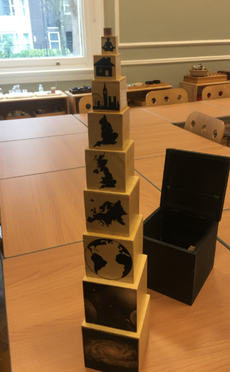 Cosmic Nesting Box, a Montessori resource in the training classroom at Montessori St Nicholas' new headquarters (right)
Cosmic Nesting Box, a Montessori resource in the training classroom at Montessori St Nicholas' new headquarters (right)
While Montessori education in the UK retains an image of being for middle-class families, Ms Stjepic is challenging that view head on. Research has shown that Montessori education can have a profound impact on disadvantaged children – an American study from 2017 found it narrowed the gap between poorer children and their peers.
The charity is launching new collaborations this year to demonstrate what the theory can do in practice.
Ms Stjepic says, ‘One of the things we as an organisation can do is more social impact work and show that the Montessori philosophy can have a social impact in a very tangible way. Research is important, but we want to show how that works in real life.’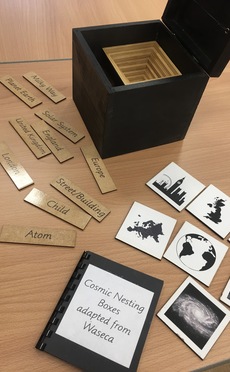 The charity has partnered with homeless charity Centrepoint to train young people for an early years Montessori qualification. The first intake of five students will start this month.
The charity has partnered with homeless charity Centrepoint to train young people for an early years Montessori qualification. The first intake of five students will start this month.
Ms Stjepic says, ‘It’s a pilot project to see how it works before we formally launch it. But they’re very excited and we’re very excited. We’re training them for a job, but they won’t just have a qualification but the parenting tools for when they become parents. Often homeless people come from chaotic family backgrounds and don’t have those role models, they don’t have the template for a stable family background. We will be giving them a qualification, but some important tools, to try to break that cycle.’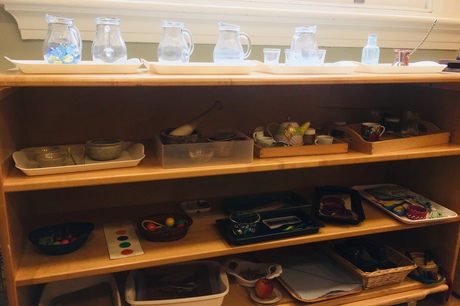
Another collaboration is with FirstLight Trust. Based in the North of England, the charity works with veterans of the armed forces and emergency services who have mental health issues, running community café hubs.
Ms Stjepic says, ‘I was talking to their founder and we were discussing how post-traumatic stress disorder doesn’t just affect the person, it affects the family. And often the issue is around childcare. And we came up with the idea of having a crèche or after-hours [service] where the whole family can go. It’s also a way of helping people who are going through counselling to connect with their children.’
Their first joint venture is in Hereford, which has just opened with a café at the front and which will have a crèche at the back for young children, run by Montessori-trained staff; it will also offer after-school provision.
The third collaboration is with the Jane Goodall Institute and its Roots & Shoots education programme, which provides free resources for schools to encourage children to implement practical positive environmental change. The next set of resources will include Montessori elements.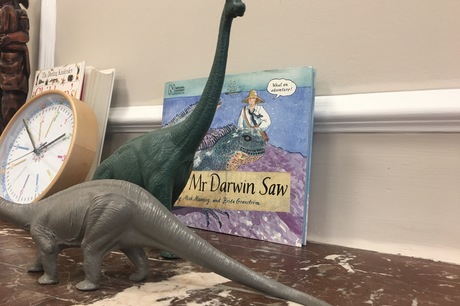
Ms Isaacs explains, ‘We wanted to introduce the Montessori element of knowledge and understanding of the world. There’s a lot of materials we can share with primary-age children – what does interdependence mean in terms of conservation and the environment today? We want to be bold and potentially we can offer them something about evolution, because evolution underpins the Montessori approach to learning.’
Sir Thomas Huxley, who was known as ‘Darwin’s bulldog’ for promoting his theory of evolution, would surely approve.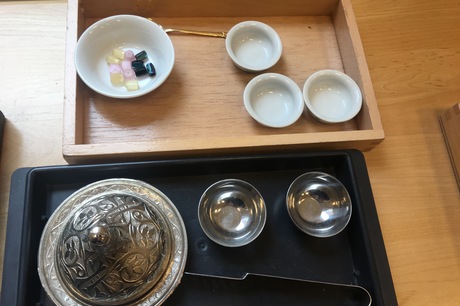
The charity is also working with the V&A Museum of Childhood in Bethnal Green to offer sessions for parents and toddlers, which will also give Montessori students the opportunity to work with them.
Further afield
And what about expanding the Montessori approach into schools? Gorton Mount in Manchester, the first primary school to successfully adopt the Montessori approach, is now part of an academy. It employs a specific member of staff for Montessori training and research under the auspices of MCI.
Aldersbrook School in Redbridge has introduced Montessori to its nursery and Reception classes and has moved from ‘requires improvement’ to Outstanding. ‘We initially offered training, now there is a trainer from the school who continues the training,’ says Ms Isaacs. ‘We’re also working with a primary in Sawbridgeworth, converting their nursery and Reception to Montessori-trained. While the initiatives with the state primaries are not extensive, they are definitely designed to be sustainable.’
However, Ms Stjepic explains, ‘We’ve come to the realisation we are not the organisation to own and operate free schools. It would take us away from the big-picture stuff we want to do. But we are keen to work with schools.’
The charity would also like to offer more bursaries to train students and has launched ‘100 for 100’, in addition to its usual bursary programme. It would also like to offer bursaries for parents to help send their children to a Montessori nursery.
It has also created a module with Cass Business School in leadership business training aimed at future nursery owners.
In other European countries and the USA, Montessori is more widely recognised in mainstream education. Ms Stjepic says, ‘As CEO, my ambition is always to be an organisation that’s not needed any more, so it would be ideal if Montessori was something that was accepted and integrated into our education system.
‘It’s not about converting everyone, but saying here is something that we think is a very powerful way of teaching and preparing young people for the world of the future.’
And what about funding? Ms Stjepic is clear that a unified voice is needed. ‘We need to have a dialogue across the sector, rather than be polarised – you get this, you don’t get that. My door is open to discuss how we can work together.’
Montessori Centenary Garden at the RHS Chelsea Flower Show
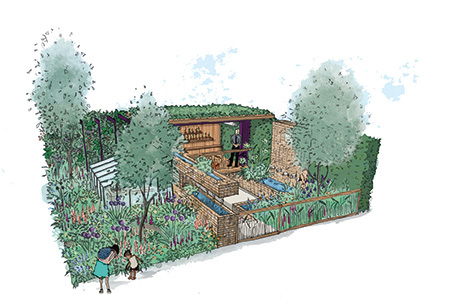
A major part of this year’s celebration is the ‘Space to grow’ garden at Chelsea Flower Show in May. Designed by award-winning horticulturist Jody Lidgard, with backing from City Asset Management, the garden will feature both traditional and cutting-edge hydroponic technology, where children can grow micro vegetables and leaves without soil. It includes a sunken greenhouse, an edible living wall, and a teaching platform above a dipping pond and water play station.
Mr Lidgard said, ‘It celebrates the work of Montessori St Nicholas by being child-led but future-driven. We will be showcasing plants [grown differently] to demonstrate the many methods of growing in small spaces that are accessible to children.’









